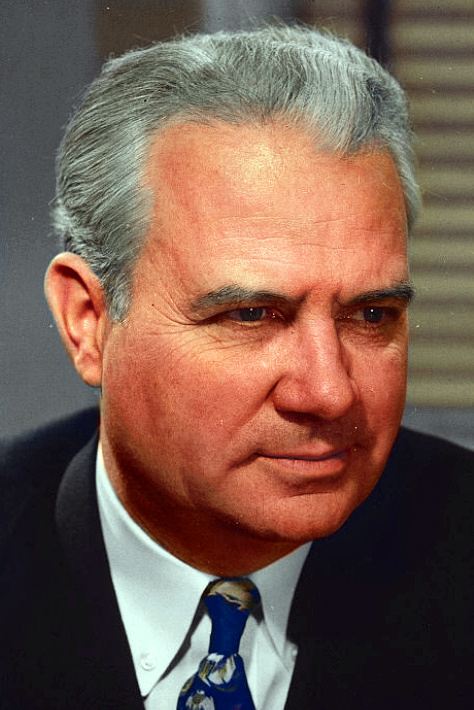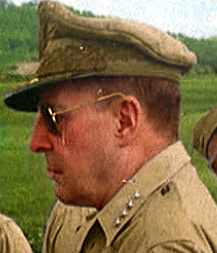
Left flourishing law practice to enter federal service
By Carlos F. Hurd, St. Louis Post-Dispatch staff writer
St. Louis, Missouri – (Jan. 22)
When black-haired, square-jawed Bob Hannegan takes over as chairman of the Democratic National Committee, some visitors to Washington headquarters are likely to ask how Hollywood came to overlook him.
Had he taken a scree test instead of the bar exams, Joel McCrea and Gary Cooper might have had competition for some of their best roles, and the 21st Ward precinct organization in St. Louis might have had to get along with a less dynamic leadership.
As it was, the boys in his ward, and the friends whom he made at City Hall, gave him a lively short term and a later, longer and less disturbed term in the St. Louis city chairmanship. There he learned to add and balance the items of urban voting strength in somewhat the way that he will have to figure the electoral trends of New York, Indiana and California next summer when, three years after conducting a losing municipal campaign, he will direct his party in a crucial contest for the Presidency of the United States.
Financial loss
Mr. Hannegan, now in Washington a little more than three months as Commissioner of Internal Revenue, is 40. Lawyers who know the extent of his practice say he took not only the $6,500-a-year job of Collector for the Eastern Missouri District, but also the $10,000 Washington job, at a financial sacrifice, and might have decided, after making good in the Washington post, to resign and return to St. Louis.
Now, however, as National Committee chairman, he is on the path that leads, in the event of party victory this year, to the President’s Cabinet, as Postmaster General, an office which has been combined with the committee chairmanship under presidents both Democratic and Republican.
Washington reports that Mr. Hannegan, since his appointment as commissioner, has been working like a beaver. He has bachelor quarters at the swank Shoreham Hotel, his family having remained in St. Louis.
Holds pep meetings
Weekends he has made train or air trips to hold pep meetings of regional collectors. Mr. Hannegan reads all papers and documents requiring his signature and has taught his immediate subordinates to do the same. This was after he found an order signed by seven sub-executives and was unable to get an outline of it from some of them.
The social swirl does not interest him, and though he finds himself in some convivial groups, he has not abandoned the no-liquor, no-tobacco rule which he adopted in St. Louis several years ago. While others lament the scarcity of their favorite beverages, he takes ginger ale.
Golf is his recreation; he plays frequently with Secretary of the Navy Frank Knox, who cites an age handicap of 29 years as a sufficient reason why Mr. Hannegan beats him.
Politicians say Hannegan tends to regard political maters in a professional and impersonal light, just as he would look at a law case; that he seldom permits himself to be drawn into heated political arguments, and will grin and walk away when others become unduly excited.
Helps his workers
Up to a year and a half ago, when he took the St. Louis collectorship, Mr. Hannegan knew about as much of its problems of accounting as any lawyer might learn from handling estates in Probate Court. He found the office bookkeeping being supervised by two men, past middle age, who were doing capably and were not complaining although they had received no adequate pay increase in a period when the work of the office had multiplied.
He got handsome pay raises for the two elderly men and kept them at their former work, with increased authority. For others, as their competency was shown, he obtained increases and promotions, he made an able clerk a department head.
By the time income-tax returns were due, at the beginning of 1943, he streamlined the procedure considerably.
Goes to Washington
About the time he was ready to plan new methods for handling the 1944 taxpayers’ rush, Mr. Hannegan was called to Washington. The administration had decided that the important national office of Commissioner of Internal Revenue, about to become vacant, should be filled from the ranks of the district collectors. Four names were considered, and Mr. Hannegan, backed by Missouri’s two Senators, was selected.
In the brief time since his appointment and confirmation in the first week of October, Mr. Hannegan extended throughout the country his rules for courtesy in forms of correspondence with taxpayers and took up a pressing problem outside income tax matters – a drive on the black market in liquor.
Mr. Hannegan is the son of Police Capt. John P. Hannegan, in St. Louis. As a student in St. Louis University, he played football and went for a time into minor-league professional baseball. He took his law degree in 1925, and in 1933, at the beginning of Mayor Bernard F. Dickmann’s first administration, was appointed by Governor Guy B. Park to the Democratic City Committee.
Named chairman
Elected chairman of the committee in August 1934, he was soon in the thick of a fight for the Mayor against his opponents in the committee and in the Board of Aldermen. He represented the city administration, at the 1935 legislative session, as city lobbyist, receiving $3,000 and expenses. One of his duties, on the Mayor’s order, was to oppose the Hess horse-dog racetrack betting bill, which the Senate defeated after it has passed the House.
In June 1935, the anti-Dickmann faction turned Mr. Hannegan out of the chairmanship. Mayor Dickmann went all-out for Mr. Hannegan with city patronage, firing adherents of anti-Hannegan men right and left. Turmoil at City Hall reached its height when, on Sept. 11, 1935, factional fighters shot up the new chairman’s office and the adjacent City Hall lawn, wounding four persons and piercing English’s coat with a bullet.
The patronage purge was effective, and in the August 1936 primary, which served as the quadrennial election of committee members, the Mayor regained control and Mr. Hannegan was reelected chairman.
In midst of probe
The 1936 primary was held in the midst of an investigation of city-wide registration frauds, instituted by The Post-Dispatch and resulting in the later removal of the entire Election Board by Governor Park “for the good of the public service.” The Mayor and Mr. Hannegan, it was learned, sought to dissuade the Governor from this action on the ground of party welfare.
Between November 1940 and April 1941 came the attempt of the Democratic majority in the Legislature to overturn the result of the state’s vote for Governor, the Republicans having elected Forrest C. Donnell by a small lead. Lawrence McDaniel, Democratic candidate, had the right to file a legal contest, but some of the party leaders decided that the Legislature should block the seating of Mr. Donnell and should then “investigate” the election. This plan, worked out chiefly by the then state chairman, C. Marion Hulen, followed a preliminary discussion at a meeting in St. Louis, called by Mr. Hannegan, at which the Mayor was present. At Jefferson City, Republican State Chairman Charles Ferguson charged that Mr. Hannegan was “riding herd” on the St. Louis Democratic legislators to keep them in line for the program. A Supreme Court decision wrecked the conspiracy.
Doubt remains
Just how far Mr. Hannegan, and the Mayor approved the Hulen scheme has been in some doubt ever since.
Some Democrats did object, and the attitude of the Mayor and chairman, in contrast, caused them to be castigated by Republican campaign speakers and contributed to the defeat of Mr. Dickmann for a third term and the election of the late Judge William Dee Becker.
Mr. Hannegan resigned from the city committee chairmanship after the election but remained as a member until his federal position made resignation mandatory. His appointment to the collectorship was opposed by The Post-Dispatch because of the governorship episode.
He and Mrs. Hannegan, formerly Miss Irma Protzmann, daughter of a late North St. Louis banker and real estate dealer, have two sons and two daughters.


